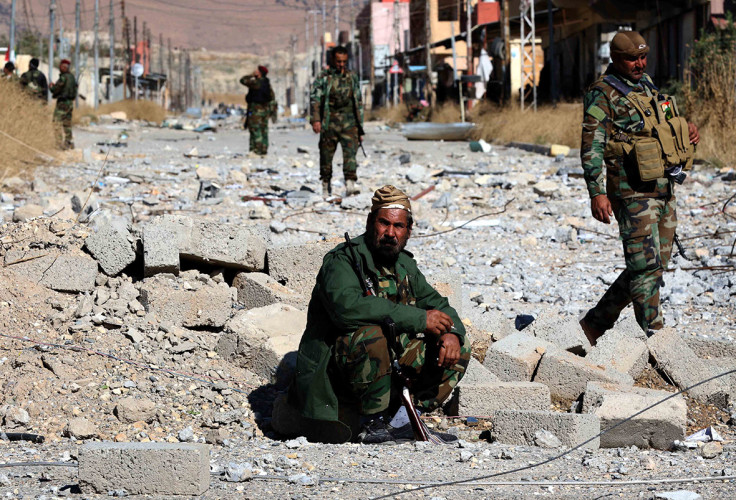Paris Attacks: Forget Sinjar and Jihadi John, Islamic State is as strong as ever

The death of Mohammed "Jihadi John" Emwazi and the defeat of Islamic State (Isis) forces by the Kurdish Peshmerga at Sinjar made for a good week for the US-led anti-IS coalition - then Paris happened.
As the world leaders of the opposition to Islamic State sat down for dinner on Friday the 13th, there seemed circumstantial evidence that the tide was turning against the army of sadistic, ruthless zealots that stormed out of the desert in 2014 and now hold sway over vast swathes of the Middle East.
In Iraq the Kurds, the only serious ally of the West in the war against IS, routed the terrorist group in Sinjar, while the "evaporation" of Emwazi during a US drone strike in Raqqa, the Syrian 'capital' of the IS caliphate was a significant propaganda coup for both the US and Britain.
The dual victories for anti-IS forces were a well-needed shot in the arm for a coalition reeling from a spate of failures, including a farcical effort to train and arm a third force that could fight both Bashar al-Assad and IS in Syria, and the entry of Russia into the conflict. Vladimir Putin's intervention in Syria has been swift and decisive and, right or wrong, has undoubtedly shown up the West's lacklustre attempt to solve the four-year civil war.
If you are going to take the fight to Isis deeper in Iraq and Syria you need effective Sunni partners: which they continue to lack
But in reality, these are symbolic gains. The liberation of Sinjar is a commendable victory for the Kurdish forces but is in an area that is part of the Kurds' sphere of influence. The fact remains that the Kurds are unlikely to turn their hand to liberating Mosul – a key IS stronghold – or any other Sunni Arab areas of Iraq without help from the Iraqi government, local Sunni forces, the West or all the above. That has been, and is, sorely lacking.
IS may appear to be on the back foot as it loses Sinjar and Emwazi – a propaganda tool, if nothing else – but the group remain entrenched in huge swathes of Iraq and Syria where neither the Kurds, the Shia-dominated Iraqi government nor the Assad regime has any interest in fighting for, at least in the short to medium term. Raqqa, in Syria, and Mosul, in Iraq, remain as far from being liberated as they were 18 months ago.
That is because both Russia, the West's rival campaigns against IS in Syria and Iraq lack the same thing: Sunni Arab partners. As Assad and Hezbollah advance from the west emboldened by Russian weapons, the Kurds press from the east and the Shia government in Baghdad, flanked by radical Shia militias, from the south. For the tribes of western Iraq and eastern Syria, there is only one Sunni Arab force operating in the region, IS.
"If you are going to take the fight to Isis deeper in Iraq and Syria you need effective Sunni partners, which they continue to lack," said Julien Barnes-Darcy at the European Council on Foreign Relations.
It is that sectarian narrative that is only encouraged by the attacks of IS-affiliates in other Middle Eastern states. The tragic attack in Beirut on 12 November targeted a Shia suburb, while the spate of bombings in eastern Saudi Arabia have hit Shia mosques. IS knows what it is doing – cementing the narrative that it is the only force capable of standing up for Sunnis in the Levant in the face of a rising Iran.
There is some hope after the victory in Sinjar, which cuts off a key supply route for IS between Raqqa and Mosul and could make it more difficult for the group to move its forces freely between Syria and Iraq. Equally, the US-backed Syrian Democratic Forces, who on 13 November captured the town of al-Houl in Hasaka Province, could grow to form the first credible Sunni Arab force in Syria, even if it is largely led by Kurds.
"With the SDF, the US seems to have created a Kurdish-led, yet relatively mixed force [but] in Iraq this force simply does not exist," said Michael Horowitz at the Levantine Group.
Even before the Paris bloodbath of Friday the 13th and the slaughter of 128 people, IS had flexed its muscle with significant attacks including the suspected downing of a Russian commercial airliner in the Sinai, which killed 244 passengers and crew, and the double-suicide bombing in Beirut that left scores of Shia Muslims dead.
The extent to which the group has grown from a low-level insurgency to a global terror franchise - far more dangerous than al-Qaeda, the perpetrators of 9/11 - waging war in half-a-dozen Middle East countries in just 18 months shows the fight to defeat it has barely begun.
© Copyright IBTimes 2025. All rights reserved.






















